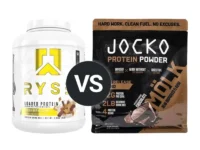Knowledge BaseYou're Questions Answered
What is protein powder?
Protein powder is a dietary supplement favored by athletes, fitness enthusiasts, and those seeking to augment their protein intake. It serves various functions, from supporting muscle repair and growth to aiding diet management and overall health optimization.
Varieties of Protein Powder:
- Whey Protein: Known for its rapid digestion and absorption, whey protein is ideal for post-workout recovery. It stimulates muscle protein synthesis effectively due to its high leucine content and complete amino acid profile.
- Casein Protein: With its slow-release properties, casein provides a prolonged source of amino acids, making it excellent for preventing muscle catabolism during fasting periods, such as overnight.
- Soy Protein: As a plant-based complete protein, soy supports heart health and is popular among vegetarians and those with dairy allergies. Its isoflavones have been noted for potential antioxidant properties and effects on hormone regulation.
- Pea Protein: Rich in iron and arginine, pea protein is highly digestible and hypoallergenic, making it suitable for those with specific sensitivities and for supporting muscle growth and cardiovascular health.
- Hemp Protein: Hemp seeds provide a protein that is not only complete but also rich in essential fatty acids and fiber, promoting a healthy heart and digestive system.
Uses and Applications: Protein powders can be incorporated into smoothies, shakes, and meals to enhance protein content effectively. They are particularly useful for meal replacements, weight management, muscle mass gain, and recovery after physical activity. Specialized formulas can also support metabolic rates, hormonal balance, and immune system health.
Physiological Effects: Regular consumption of protein powder can lead to improved muscle mass, strength, and recovery times in athletes. For non-athletes, it can help in maintaining muscle mass, especially during weight loss or aging, and support overall metabolic health. Protein's role in satiety can also aid in appetite control and weight management strategies1.
- Phillips, S. M. (2014). A brief review of higher dietary protein diets in weight loss: a focus on athletes. Sports Medicine, 44(S1), S149-S153.
- Paddon-Jones, D., & Leidy, H. (2014). Dietary protein and muscle in older persons. Current Opinion in Clinical Nutrition and Metabolic Care, 17(1), 5-11.
- Devries, M. C., & Phillips, S. M. (2015). Supplemental protein in support of muscle mass and health: advantage whey. Journal of Food Science, 80(S1), A8-A15.
Related Questions
Related Reviews
Protein vs Protein
Your Answer
We are a participant in the Amazon Services LLC Associates Program, an affiliate advertising program designed to provide a means for us to earn fees by linking to Amazon.com and affiliated sites.

